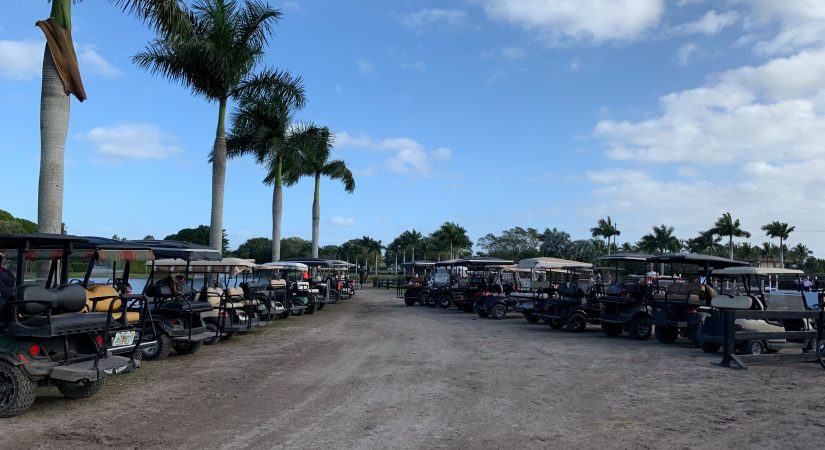Q: We are planning to rent a golf cart during an upcoming horse show in Florida. What are some things we need to keep in mind? Can my 14-year-old daughter drive the cart, even though she doesn’t have a driver’s license yet?
A: UPDATE: There is a US Equestrian Federation rule about this very topic! Per rule GR1301.7 of the USEF Rule Book:
“7. Minors who do not have a valid driver’s license which allows them to operate a motorized vehicle in the state in which they reside will not be permitted to operate a motorized vehicle of any kind, including, but not limited to, golf carts, motorcycles, scooters, or farm utility vehicles, on the competition grounds of licensed competitions. Minors who have a valid temporary license may operate the above described motorized vehicles as long as they are accompanied by an adult with a valid driver’s license. The parent/legal guardian or individual who signs the entry blank as a parent or guardian of a minor operating a motorized vehicle in violation of this rule are solely responsible for any damages, claims, losses or actions resulting from that operation. Violations of this rule will be cause for penalties against those responsible for the child committing the offense. Wheelchairs and other mobility assistance devices for individuals with disabilities are exempt from this rule.”
So, the short answer is, no, your daughter may not operate a golf cart on the show grounds unless she has a valid driver’s license. However, she may still be able to drive the cart off-site.
The first thing to know is that each state has its own rules regarding the age requirements for driving a golf cart. As a result, what may be considered an acceptable age in one place could be illegal in another. This is why it is important to always check the rules and regulations if you are considering letting a minor drive a golf cart.
In most states (including Florida), a child has to be at least 14 years of age to be able to drive a golf cart. In other places such as Texas, the driver has to be around 16 years old. Then there are states such as California and South Carolina that allow children to drive golf carts at the age of 13.
It’s also important to know what Florida defines as a golf cart versus an LSV (low-speed vehicle). According to its statute, Florida defines an LSV as a four-wheeled electric vehicle whose top speed is greater than 20 mph, but less than 25 mph. The minute that golf cart exceeds speeds of 20 mph, it becomes an LSV and is subject to a different set of rules. In Florida, low-speed vehicles are considered motor vehicles and are required to be titled, registered, and insured with Personal Injury Protection and Property Damage Liability coverage in order to be operated on Florida streets and highways, while golf carts in Florida are not required to be insured (although insurance, even on golf carts, is highly recommended).
Also, any person operating an LSV must have a valid driver’s license in their immediate possession. Be aware that your daughter may be able to drive the golf cart, but not an LSV—make sure you know which one you’re renting!
So, even though a golf cart driver is not required by Florida law to be a licensed driver, it is nonetheless a good idea. In addition to being of age, drivers are also required to know the rules of the road and how to safely operate such a vehicle.
Now that you know your 14-year-old daughter can legally operate a golf cart in Florida, but not an LSV, you should also be aware of liability concerns and consider if it is worth the risk if she damages property or injures someone. Here are a few questions you might still have:
- Will Equine Activity Statutes offer any protection?
Equine Activity Statutesmay offer protection at show if, for example, a rider is injured because of a horse spooking at a golf cart being operated by a minor. Florida statute states in part that “Inherent Risks of Equine Activities” includes: “The unpredictability of an equine’s reaction to such things as sounds, sudden movement, and unfamiliar objects, persons, or other animals.” Fla. Stat. Ch. 773.01(6)(b). If, however, the minor (who must have a valid driver’s license) is found to have negligently operated the golf cart to have caused the horse to spook and injure another person, the statute may not afford protection.
- What if your daughter injures someone or damages their property?A suit may be brought against the parents of a minor operating a golf cart, but questions of whether insurance coverage exists may impact the remedy available to the person(s) injured. A suit alleging that parents are vicariously liable for the negligence of their minor child operating a golf cart may present obstacles even if the child had parental permission. Parties may seek the coverage afforded under a homeowners or automobile policy as both parties typically would benefit if coverage was provided under the policy. Oftentimes, however, exclusions are incorporated into the contract language, and if clearly written and the contract was freely entered into by both parties, courts may uphold and honor the language of exclusion. Questions of law concerning insurance policy interpretation will impact the outcome of a suit.
In one instance involving parents sued for the vicarious liability of their minor child operating a golf cart that struck another child riding a bicycle, the court agreed that the homeowner and automobile coverage exclusions applied and the parents lacked liability coverage. Contract language often contains exclusion for personal liability or bodily damage arising out of a golf cart if the golf cart is not being used to play golf on a golf course or if the vehicle is designed mainly for use off public roads. Insurance clauses and exclusions may vary in scope and language.
It is prudent to be familiar with the specific coverage your policy provides before allowing a minor who has a valid driver’s license to operate a golf cart on horse show premises where an injury could easily arise from an accidental encounter with another person, golf cart, or horse.
- Do golf cart rental companies offer additional insurance?
It is worthwhile to inquire into available coverage that may be available for purchase when renting a golf cart. Be certain to review the coverage and exclusions before you purchase protection and determine whether the anticipated use of the golf cart and the intended users will be covered in the event of bodily injury or property damage.
SAFETY TIPS:
- Riding in a golf cart can be fun and useful in getting around the show grounds, but remember that it is a moving vehicle, albeit at slow speed, and certain safety rules should be followed. Teach children that they should remain seated with their feet on the floor. Seatbelts, if available, should be worn, and passengers should hold on to the armrest or safety bars, particularly while the cart is turning. Passengers are more likely to fall from rear-facing seats in the cart, so younger children should be put in a forward-facing seat.
- We all know the dangers of heads hitting pavement if someone falls off a bike. The greatest risk for children (and all passengers) is ejection from the vehicle. If a child is in the golf cart, try and encourage them to keep their riding helmets on as a safety precaution. It will provide protection should they fall or be ejected from the cart.
- Avoid sharp turns at high speed. Reduce speed when going downhill or around blind corners, and always yield to pedestrians and riders.
- Look behind your golf cart before backing up. You don’t want to catch an approaching rider by surprise!

